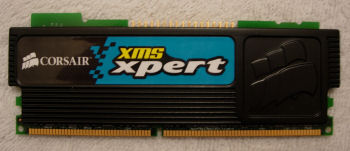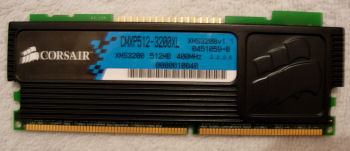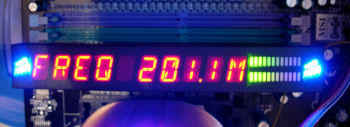Corsair XMS Xpert Memory
Let's start by taking a look at the memory module itself - At a glance, nothing unusual, we have a stick of RAM that looks decidedly like a standard piece of Corsair XMS memory.On the opposite side of the module we see the speed and rating for this particular stick - As I mentioned earlier final speeds and latencies are yet to be decided on, but our sample here is a 512MB stick, running at 400MHz DDR (PC3200 speeds) with timings of 2-2-2-5.
Thus far then, nothing to be excited about. But wait, what are these pins on the top of the module?
Now we're getting to the crux of the matter, and one of the big selling points of the Xpert range - These modules include support for an LED module which can be attached to the top of one or two sticks of XMS Xpert RAM to give readings from a variety of facets of the memory. All of this is then shown on the 10 digit alphanumeric display of the module, giving you easy access to temperature and voltage readings of your memory amongst other things.
The LED module simply snaps on to the connector on top of either one or two of the Xpert sticks, and you're ready to go - Installation really is that simple.
Once that's done, simply boot up your PC, and after a few seconds the LED module will begin to scroll various readings about your memory across its screen.
As you can see from these images, the module also makes use of a couple of blue LEDs showing the Corsair logo to add to the 'pretty factor', as well as making use of a couple of bars on the right of the module to show memory reads and writes - The more work the memory is doing, the higher the bars will go. All in all, it's exceedingly cool, and for some people will no doubt also be exceedingly useful. But that's still only half the story...

















